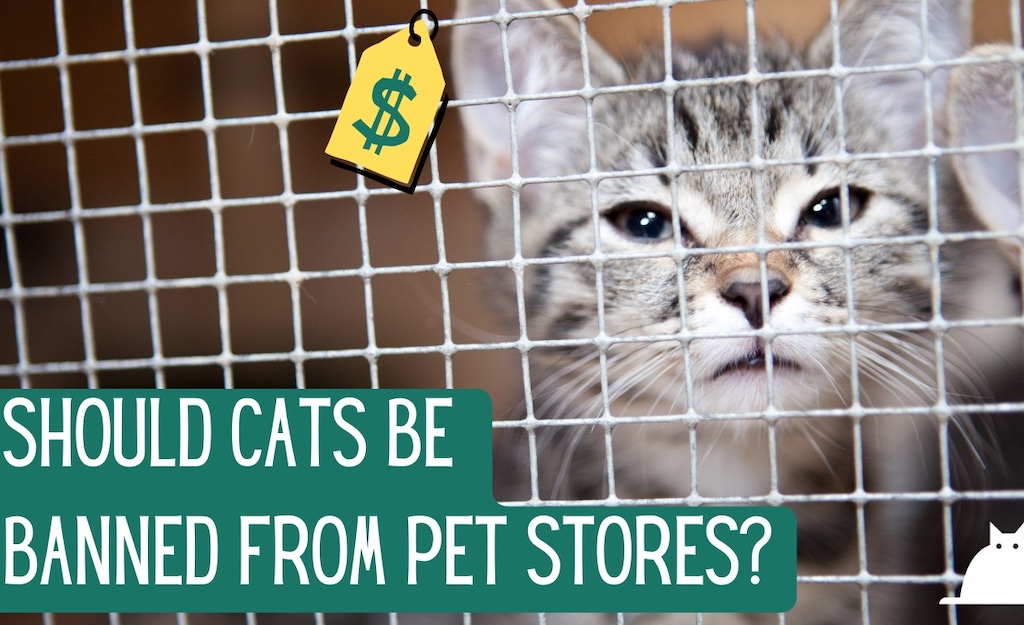Pet stores have long been a go-to place for families looking to bring home a new animal, but it seems the tide is swiftly changing. Organisations throughout the US have been lobbying to ban the sales of cats and dogs in pet stores, and, some would say, rightfully so.
Pet stores (admittedly, not all of them) are known for purchasing kittens from irresponsible breeders (puppy or kitten mills) with the aim of lowering costs and increasing profits. While puppy mills get a lot of press, kitten mills are common throughout the US too, and many of these facilities’ top customers are pet stores.
What is the issue with selling cats and kittens in pet stores?
Pet stores that sell kittens often get them from middlemen, not the mills directly. While the store’s staff may reassure you that the kittens for sale were humanely raised, it’s difficult, if not impossible, for them to know for certain the conditions where the kittens were bred. Of course, seeing a kitten in a pet store pulls on your heartstrings, and you may rightly assume that you’re giving the kitten a great home, so how is there any harm in this? The problem lies at the source: the conditions and facility in which the kitten was bred.
Mill-bred cats are often kept in cramped wire cages with little or no access to exercise or socialisation with other cats or humans. Without going into too much detail, these facilities often range from cramped and uncomfortable at best, to downright frightening. During raids on animal breeding centres, law enforcement and animal welfare representatives routinely find animals in conditions that no animal should ever experience.
So, while it’s true you are giving that little kitten at the pet store a better home, you are often directly putting money into the pockets of these cruel mills. Excitedcats.com in-house veterinarian Dr Lorna Whittemore (BVMS) also highlights the potential for behavioural issues with these kittens: “The sensitive socialisation period for kittens is typically between two and seven weeks of age. If this time is spent in a kitten mill, they cannot learn appropriate life skills. This, in turn, can affect the cats for the rest of their lives, resulting in unnecessary stress and behavioural difficulties.”
It’s also important to remember that every time a kitten is purchased from a pet store, a shelter kitten loses their chance at a loving home. Rescue shelters should always be the first place to look for a kitten to bring home, but responsible breeders that take care of their animals and carefully select the owners whom they home their kittens with are also a good option.
What places currently have bans?
The state of New York recently became the latest state to prohibit the sale of kittens in pet stores, and this ban will take effect in 2024. Other states that have similar bans include California (which enacted a similar law in 2017 and became the first state to ban these sales), Maryland (2020), Illinois (2021), and Washington (2021), plus over 380 localities across the country. Britain also put a ban in place for third-party sales of cats or dogs under six months old back in 2018.
What will bans do overall?
Banning the sale of kittens from pet stores should, hopefully, encourage potential owners to adopt from shelters instead, or from a reputable breeder at least. This, in turn, should theoretically put these cruel mills out of business. Buyers in these states or regions will now have to deal directly with the breeder or an authorised rehoming centre. In-house exictedcats.com veterinarian Dr Luqman Javed (DVM) also urges citizens to do their part: “Residents should pressure local authorities and congress representatives to perform more checks on breeders/mills to ensure that only those which meet certain standards are allowed to breed and sell animals.”
It seems that taking the step to ban not only kittens but puppies and rabbits from pet stores is a good one for pets overall. There is still certainly a long way to go, but not supporting these stores is as good a place to start as any.





